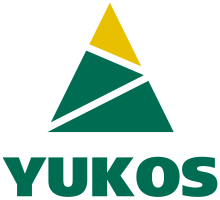Yukos Oil
 |
|
|
Native name
|
Нефтяна́я Компа́ния Ю́КОС |
|---|---|
| Industry |
|
| Fate | Bankrupted |
| Founded | Moscow, Russia (April 15, 1993) |
| Defunct | November 21, 2007 |
| Headquarters | Moscow, Russia |
|
Key people
|
|
OJSC "Yukos Oil Company" (Russian: Нефтяна́я Компа́ния Ю́КОС, IPA: [ˈjukəs]) was an oil and gas company based in Moscow, Russia. Yukos was acquired from the Russian government by Russian oligarch Mikhail Khodorkovsky's Bank Menatep during the controversial "loans for shares" auctions of the mid 1990s. Between 1996 and 2003 Yukos became one of the biggest and most successful Russian companies, producing 20% of Russia's oil output, as much as Libya or Iraq, and Khodorkovsky became an advocate of democratization, international co-operation and Russian reform. In October 2003 Khodorkovsky—by then the richest man in Russia and 16th richest man in the world—was arrested, and the company was forcibly broken up for alleged unpaid taxes shortly after and declared bankrupt in August 2006. Courts in several countries later ruled that the real intent was to destroy Yukos and obtain its assets for the government, and act politically against Khodorkovsky. In 2014 the largest arbitration award in history, $50 billion (€37,2 billion), was won by Yukos' former owners against Russia.
From 2003-04 onwards, the Russian government presented Yukos with a series of tax claims totaling US$27 billion (€20,1 billion). As the government froze Yukos' assets at the same time, and alternative attempts to settle by Yukos were refused, the company was unable to pay these tax demands. Between 2004 and 2007, most of Yukos's assets were seized and transferred for a fraction of their value to state-owned oil companies.
The Parliamentary Assembly of the Council of Europe condemned Russia's campaign against Yukos and its owners as manufactured for political reasons and a violation of human rights. Between 2011 and 2014 several court cases were won by the former company's management and investors against Russia or against the companies that acquired Yukos assets. The European Court of Human Rights ruled that there had been unfair use of the legal and tax system; the , an established neutral body used by Russia and the West since the 1970s for trade disputes, concluded that the government's action was an "unlawful expropriation" using "illegitimate" tax bills, whose effect was intended to "destroy Yukos and gain control over its assets".
...
Wikipedia
